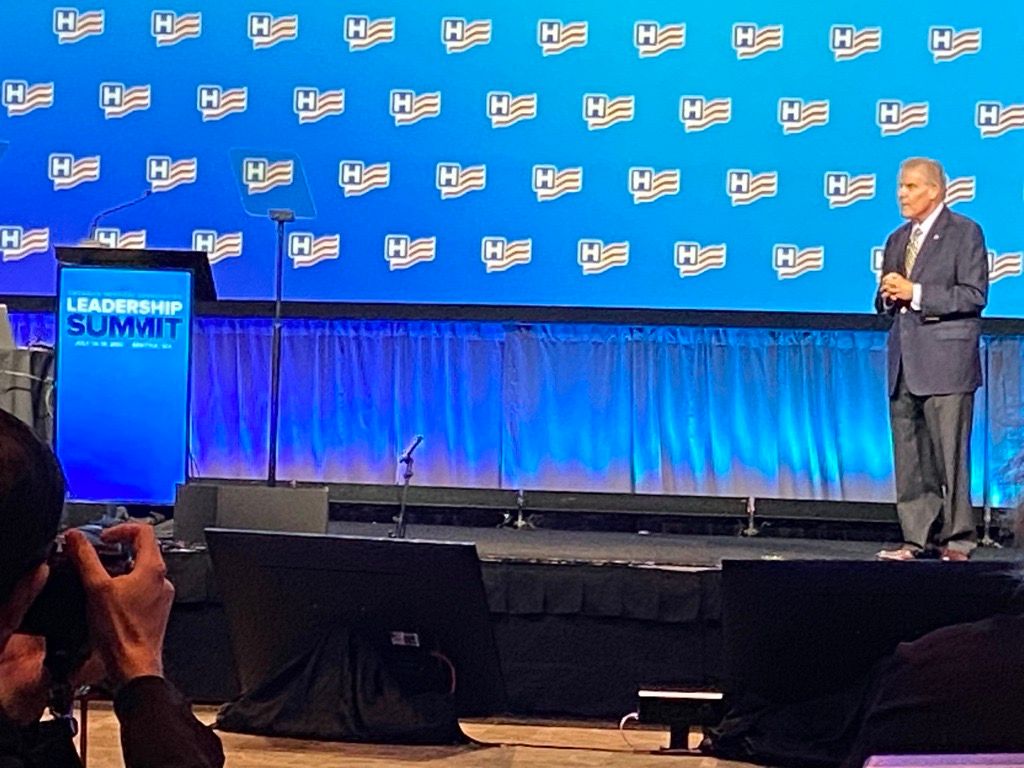Rick Pollack: Hospitals need more support from Washington | AHA Leadership Summit
The president and CEO of the American Hospital Association says health systems must get more from Medicare and also discussed other difficulties for hospitals.
Seattle - Rick Pollack rallied hospital leaders while also warning about the difficulties health systems face if they don’t get some more help.
Rick Pollack, president and CEO of the American Hospital Association, says health systems need more federal aid to deal with rising costs. (Photo: Ron Southwick)

In a speech to hospital leaders at the beginning of the American Hospital Association Leadership Summit, Pollack pointed to insufficient federal aid to hospitals and the need for Washington to take stronger action against commercial insurers.
“We do provide essential health services and it is in America’s interest to keep hospitals and health systems strong,” Pollack said.
Medicare is failing to meet the higher costs for hospitals since the COVID-19 pandemic, Pollack said.
The cost of care for hospitals has risen 18% over the past three years, while Medicare rates have risen less than half that amount, Pollack said.
“You don't have to be a mathematician to understand the arithmetic does not add up,” Pollack said. “Our government needs to change how it updates these rates. Right now, the math is flat out wrong.”
Pollack also said Medicare and Medicaid must provide more support for boarding patients. Health system leaders in the past year have said they’ve been forced to keep patients even when they are ready for discharge, because of a lack of beds at nursing homes or other post-acute facilities. He said there must be more support for metropolitan anchor hospitals and struggling rural hospitals.
In addition, Pollack also spoke out against proposals to reduce Medicare funding for hospitals for some outpatient services.
Lawmakers have voiced growing support for “site-neutral” funding proposals that they say would level the playing field for physician offices and clinics. Arguing against such proposals, Pollack said hospitals provide outpatient care for more complicated cases, must maintain emergency services, and they face greater regulatory burdens than other providers.
Pollack expressed concerns as more states are reviewing Medicaid eligibility now that the federal government’s Public Health Emergency for COVID-19 has ended. Healthcare leaders have warned that many could lose coverage, adding more strain on hospitals and forcing them to provide more charity care. Pollack warned of projections of as many as 18 million Americans losing Medicaid coverage.
Hospitals have already started to see some impacts. About 1.5 million Americans have lost Medicaid coverage, according to an analysis by the Associated Press.
While Pollack talked about problems with public payers, he drew applause when he turned to commercial insurance companies and said they need to be held accountable “for their irresponsible behavior.”
Pollack denounced insurers for denying payments and unreasonable delays in the process of prior authorization, where payers must give approval for recommended services and treatment. Most nurses and hospitals said prior authorization burdens are delaying patient care, according to recent polling by Morning Consult, commissioned by the hospital association.
On the upside, Pollack hailed the growing support in Washington to streamline the prior authorization process.
“We're making progress, real progress, in dealing with these issues, particularly as it relates to the prior authorization, in both regulatory actions and proposed legislation, and it's a bipartisan issue,” he said.
Lawmakers have been calling for reforms to prior authorization in the increasingly popular Medicare Advantage plans. Nearly 300 members of Congress have urged the Centers for Medicare and Medicaid Services to make changes.
Hospitals also need the government to continue to provide discounts for outpatient drugs in the 340B program, Pollack said. The program is designed to help health systems that serve greater shares of patients with lower incomes and those in underserved communities.
The CMS recently proposed $9 billion in payments to hospitals in the 340B program, resolving a years-long dispute that ended with hospitals winning a high-profile legal battle that went all the way to the Supreme Court.
“We were extremely pleased that 340B hospitals will finally be paid back or they deserve so they can continue providing care to their patients and communities,” Pollack said, drawing more applause.
Pollack said the hospital association was especially pleased that the government proposed a lump-sum payment to offer relief more quickly. But Pollack said there are concerns that some hospitals, including children’s hospitals and rural hospitals, could be hurt by cuts in other Medicare programs.
“We’re going to review the proposal closely to determine next steps,” Pollack said.
Telehealth faces a looming deadline in Washington | Healthy Bottom Line podcast
February 12th 2025Once again, the clock is ticking on waivers for telemedicine and hospital-at-home programs. Kyle Zebley of the American Telemedicine Association talks about the push on Congress and the White House.